The streets of Harbourfront and the Financial
District combine old and new in a vibrant mix. Along the shores of Lake
Ontario, the origins of the city can be traced to the establishment of
Fort York in 1793. As the town of York grew, spreading north from the
lake, financial institutions settled around Bay and King streets. Today,
modern skyscrapers, interspersed with historic buildings, dot the
district, and historic vaudeville theaters, restored to their original
splendor, anchor an exuberant entertainment scene.
|
On June 18, 1812, the
US declared war on Great Britain and, for months, battled at various
border outposts such as Detroit and Queenston Heights. In April 1813,
American troops invaded York (as Toronto was then called), occupying the
town, burning the Parliament buildings, and destroying much of Fort
York. Although the US won the Battle of York, they soon abandoned the
town to fight battles in the Niagara Peninsula, with mixed results. The
American war with Britain ended in stalemate on December 24, 1814, with
the signing of the Treaty of Ghent.
|
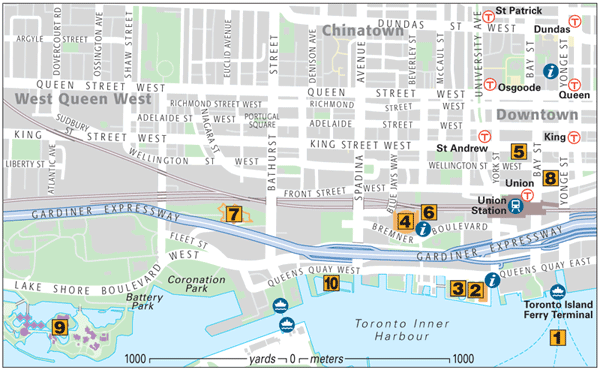
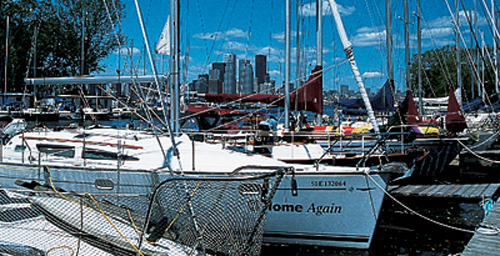
Marina at Harbourfront
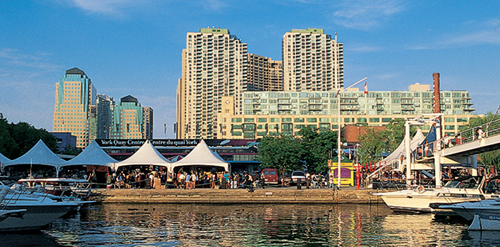
SightsToronto Islands Recreational
opportunities – from sunbathing to cycling to children’s amusement
rides – abound on the car-free islands, Toronto’s summer playground for
more than a century. Ferries depart regularly for the islands from the
foot of Bay Street; the 10-minute trip across the harbor offers
unparalleled views of downtown . Queen’s Quay Terminal In
a grand 1926 building that looks like a layered cake, this retail
complex is bursting with boutiques selling unusual gift items, Native
art, crafts, clothing, kitchenware, toys, and chocolates. Many
restaurants, several with patios overlooking the water, offer good fare.
Harbor cruises depart alongside the terminal. 207 Queens Quay W 416 203 0510 Open 10am–6pm daily
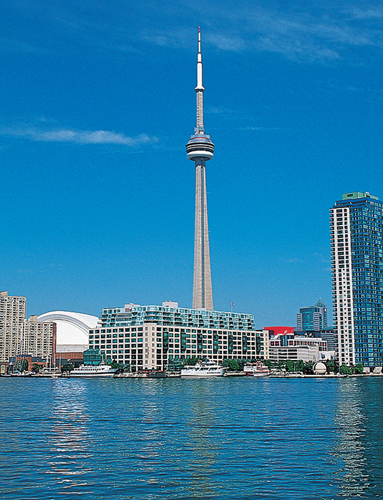
Queen’s Quay Terminal
York Quay Centre This
converted warehouse is the center for a diverse range of recreational
and cultural activities, from exhibitions to performances to skating.
Visitors can watch artisans create glass and clay pieces at the craft
studio, check out the four galleries, and browse in the excellent shop
selling handcrafted gifts. The Photo Passage exhibits contemporary
Canadian photographic works; other venues regularly program author
readings and theater performances. A café overlooking the pond, which
becomes a popular skating rink in winter, serves light meals and snacks. 235 Queens Quay W 416 973 4000 Open 10am–9pm Tue–Sat
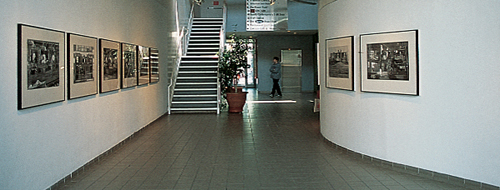
Photo Passage, York Quay Centre
Rogers Centre At
the base of the CN Tower, this sports and large-events venue is home to
the city’s baseball team, the Blue Jays, and football team, the
Argonauts. When built in 1989, it had the world’s only fully retractable
roof of its kind, which takes just 20 minutes to open or close. When
teams are not in action, you can tour the facility and peek into
players’ dressing rooms. Outside, on the northeast corner of the
building, a frieze by Toronto artist Michael Snow depicts 14 spectators. 1 Blue Jays Way 416 341 1707
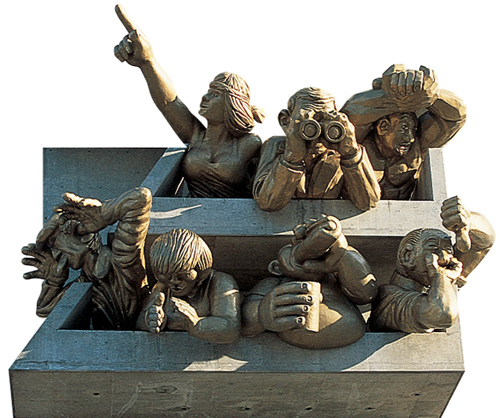
Detail from The Audience, by Michael Snow, Rogers Centre
Toronto-Dominion Centre This six-tower complex is one of the most important pieces of architecture in the city .
The black steel I-beams of the 1968 Toronto Dominion Bank Tower are
trademark Mies van der Rohe (1886–1969), and perfectly reflect the
architect’s modernist dictum that “Less is more.” In the plaza, a
circular bronze sculpture, Al McWilliams’s Wall and Chairs, echoes the towers’ austerity. Below ground is a shopping mall, the only one van der Rohe ever designed.
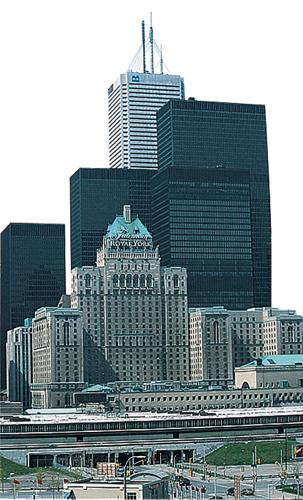
Toronto-Dominion Centre
CN Tower Soaring
1,815 ft (553 m) above downtown Toronto, this is the defining icon of
the city’s skyline and the world’s tallest free-standing structure. On
the mezzanine level, check out the exhibit on the tower’s construction
before “bungee jumping” from the top at an interactive daredevil
display. Then let a glass-fronted elevator zip you, in less than a
minute, to one of four lookout levels. The extra fee for the highest
lookout, Sky Pod, ensures fewer crowds. The revolving restaurant, 360,
offers fine food in serene surroundings . Fort York This
garrison, established by Lieutenant Governor John Graves Simcoe in 1793
to protect the growing city, is the site of the fierce Battle of York
during the War of 1812, when the US invaded Upper Canada. Home to the
country’s largest collection of War of 1812 buildings (brick structures
that replaced the fort’s original wood cabins), the restored fort has
fascinating displays of historic military artifacts. Guides in costume
lead tours and give period music, musket, and drill demonstrations. Hockey Hall of Fame Hockey
fans will be fascinated by the memorabilia on view at this museum
dedicated to Canada’s favorite sport. Everything from masks personalized
by goalies to hand-carved skates from the 1840s reflect the history of
the game. Have your photo taken with the iconic Stanley Cup, then test
your skill at the game at the interactive exhibits . Ontario Place This
family-oriented, summertime amusement park built beside, around, and
literally on top of Lake Ontario embraces its waterfront perch with
enthusiasm. Water-fun options include giant waterslides and river rides.
Visitors looking for more serene activities can paddle around the
lagoon in a pedal boat. The Cinesphere IMAX theater, housed in a
futuristic Triodetic dome, shows documentary films on subjects ranging
from caves to rainforests to auto racing on its six-story screen.

Cinesphere, Ontario Place
Toronto Music Garden This
playfully elegant garden, a collaboration between famed cellist Yo Yo
Ma, landscape architect Julie Moir Messervy, and Toronto landscape
architects, was inspired by J. S. Bach’s First Suite for Unaccompanied Cello.
Each dance movement in the suite – allemande, courante, sarabande,
menuett, and gigue – plus a prelude, is represented by the plantings in
one of the six sections of the garden. Summer concerts are held in the
grassy amphitheater.
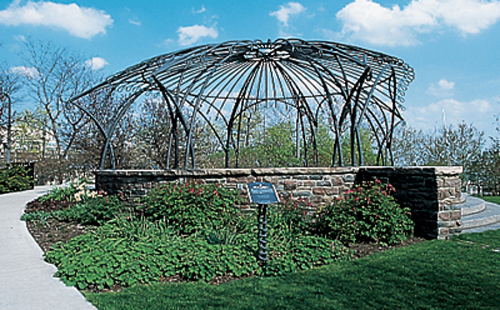
Toronto Music Garden
|